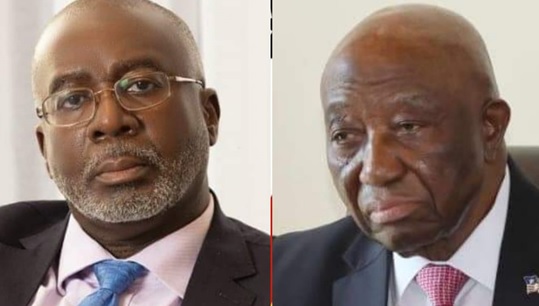MONROVIA – Liberia is currently facing a serious crisis as signs of declining rule of law and order emerge, exacerbated by President Joseph Boakai’s apparent passivity. This crisis is being driven by internal conflict within the House of Representatives, where a faction of lawmakers has seemingly disregarded constitutional protocol in an attempt to remove House Speaker Cllr. Jonathan Fonati Koffa. Calling themselves the “Majority Bloc,” this faction reportedly has the implicit backing of President Boakai’s administration, despite government officials denying any role in this destabilizing effort.
For nearly three weeks, the House has been in turmoil, with intense debates and even physical confrontations disrupting legislative sessions. The President’s inaction in the face of these events has drawn significant criticism, as many argue that his leadership is vital to restore order and set an example for stability. As tensions escalate, fears are growing that this legislative chaos could spiral into broader unrest that destabilizes the entire country.
According to the Liberian Constitution, the process for removing the Speaker requires a two-thirds majority—equivalent to 49 of the 73 lawmakers. However, the dissenting lawmakers have not yet reached this threshold, creating a legislative stalemate. Simultaneously, Speaker Koffa has struggled to secure the 37 votes required to maintain his authority and conduct official business. This deadlock has fractured the House into two competing blocs, with the dissenting lawmakers conducting their own unauthorized sessions. These unofficial gatherings highlight their unwillingness to recognize Speaker Koffa’s authority, further entrenching the political divide and creating an institutional crisis.
The apparent involvement of the Boakai administration in this legislative rebellion has raised serious concerns among political observers. Reports indicate that high-ranking government officials, including President Boakai’s nephew and various cabinet members, have engaged with the dissenting bloc, lending it credibility and creating the perception that the government implicitly endorses the effort to unseat Speaker Koffa. This perceived support from the executive branch challenges Liberia’s democratic principles, as it suggests that the administration may be willing to bypass constitutional norms for political gain.
On Tuesday, the tensions within the House erupted into open conflict, with members of opposing factions clashing over control of the legislative chambers. Witnesses reported a chaotic scene as lawmakers pushed and shoved to gain dominance, with some property being damaged in the process. The confrontation ultimately required police intervention to restore order. However, the police response was widely criticized, with accusations that officers displayed favoritism toward the dissenting lawmakers, further inflaming the already volatile situation. This perceived partiality among law enforcement officials underscores concerns about the rule of law and deepens public disillusionment.
As the immediate situation stabilizes, Liberia is left facing critical questions about the future of its democratic institutions. Speaker Koffa, who has refused to resign despite mounting pressure, is constitutionally protected in his role, but his ability to lead is now deeply compromised by this political rift. With both sides unwilling to yield, the standoff threatens to undermine the very foundation of the legislature, reducing its ability to function effectively and address the nation’s pressing needs.
President Boakai’s response, or lack thereof, to this crisis may have far-reaching consequences for Liberia’s governance. Allowing cabinet members and close allies to align with the dissident bloc has cast doubt on the President’s commitment to upholding democratic norms and the rule of law. By permitting this standoff to continue, the administration risks instigating a series of consequences that could destabilize the government and erode public trust. Legislative gridlock could become the norm, preventing the House from passing laws and addressing essential policy issues, further straining the relationship between the executive and legislative branches and fostering heightened political tension.
The political impasse also risks alienating Liberia’s citizens, who may grow increasingly frustrated with the administration’s perceived indifference to the constitutional crisis. This public dissatisfaction could have long-lasting implications, influencing future elections and shaping the political landscape. Without a decisive resolution, Liberia’s critical issues, such as budget approvals, healthcare initiatives, and infrastructure projects, are likely to face significant delays, directly impacting citizens reliant on government services.
In extreme cases, President Boakai’s perceived role in this standoff could prompt calls for impeachment, as public discontent grows over the government’s inability to maintain legislative functionality. Additionally, the judiciary may be called upon to intervene, with courts potentially interpreting and setting boundaries on executive power in relation to legislative authority. Such involvement would not only bring legal scrutiny to the administration’s actions but could also shift the balance of power within Liberia’s political system.
As the crisis unfolds, Liberia finds itself at a crossroads. The Boakai administration’s next moves will be critical in determining whether the nation can overcome this period of instability or if it will descend into a deeper political crisis. With democratic governance, the rule of law, and public confidence hanging in the balance, President Boakai’s leadership is being tested. His choices now will define not only his legacy but also the trajectory of Liberia’s democratic institutions and the stability of the nation for years to come.







